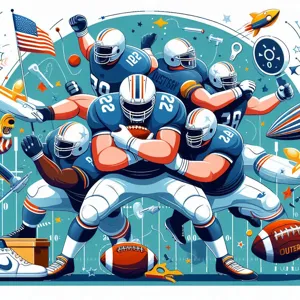In the world of American football, success extends far beyond the sheer talent of individual players; it thrives in the very culture that binds a team together.
“Crafting Champions: Building a Winning Culture in american Football Teams” delves into the nuanced interplay of camaraderie, discipline, and shared vision that form the backbone of championship-winning squads. From the locker room to the field, a winning culture fosters resilience, accountability, and a relentless pursuit of excellence, shaping not only the athletes but also the coaches and the entire organization. In this blog post, we’ll explore the key elements that contribute to a thriving football environment, including effective leadership, open communication, and the importance of mental toughness. Join us as we uncover the secrets behind transforming a group of talented individuals into a cohesive unit that not only competes but also dominates on the field. Whether you’re a coach, player, or passionate fan, this guide will inspire you to understand the vital role culture plays in crafting champions.
1. Understanding Winning Culture in Sports

Understanding winning culture in sports is the cornerstone of building a successful American football team. At its core, a winning culture transcends mere talent and skill; it embodies a collective mindset that prioritizes excellence, resilience, and teamwork. This culture is cultivated through shared values, a unified vision, and a relentless pursuit of success both on and off the field.
In American football, where the stakes are high and competition is fierce, a winning culture begins with strong leadership. Coaches and team captains play a pivotal role in establishing expectations and fostering an environment where every player is encouraged to strive for greatness. This involves not only setting performance goals but also instilling a sense of accountability among team members. When players understand that their actions contribute to the team’s overall success, they are more likely to push themselves and one another to elevate their game.
Moreover, a winning culture hinges on effective communication. Open dialogue between coaches and players creates an atmosphere of trust and collaboration, allowing for constructive feedback and continuous improvement. Teams that embrace this culture are better equipped to navigate challenges and adapt to changing circumstances, whether it’s a tough loss or an injury to a key player.
An essential element of a winning culture is the development of a growth mindset. This involves viewing challenges as opportunities for learning and improvement rather than setbacks. Successful teams encourage players to embrace adversity, learn from mistakes, and celebrate progress, fostering an environment where resilience flourishes.
Finally, a winning culture extends beyond the field. It encompasses community engagement, a commitment to sportsmanship, and a focus on personal development. When players and coaches are invested in the well-being of their community and each other, they build a sense of belonging that strengthens team cohesion and loyalty.
In summary, understanding winning culture in sports is about cultivating an environment where players are motivated to excel, learn from adversity, and support one another. It is this foundation that ultimately transforms a group of talented individuals into a formidable team, ready to face any challenge that comes their way in the pursuit of victory.
2. The Role of Leadership in Team Culture
In the dynamic world of American football, leadership is the cornerstone of a winning culture. Effective leaders—be they head coaches, captains, or veteran players—set the tone for the entire team, shaping not only the strategies on the field but the attitudes and behaviors in the locker room. A strong leader inspires trust and respect, fostering an environment where players feel valued and empowered to contribute their best.
Leadership in football goes beyond mere tactics; it encompasses the ability to communicate a clear vision and motivate players to rally around that vision. Leaders must cultivate an atmosphere of accountability, where every player understands their role and takes ownership of their responsibilities. This culture of accountability encourages teammates to push one another, instilling a relentless pursuit of excellence.
Moreover, effective leaders are adept at recognizing and addressing the diverse needs of their players. They understand that each individual brings unique strengths and challenges to the team. By fostering open communication and encouraging feedback, leaders can create a safe space where players feel comfortable expressing their thoughts and concerns. This inclusivity builds camaraderie and strengthens bonds among teammates, essential components for a cohesive unit on and off the field.
As the team navigates the inevitable highs and lows of a season, strong leadership provides stability and resilience. Leaders serve as role models, demonstrating a commitment to hard work, discipline, and perseverance. Their actions inspire others to rise to the occasion, reinforcing the idea that a winning culture is built on collective effort and shared values.
In essence, the role of leadership in team culture is multifaceted—it is about setting the vision, fostering accountability, embracing diversity, and embodying the values that define the team. When leadership is strong, the culture flourishes, creating an environment where champions are forged and the dream of victory becomes a tangible reality.
3. Defining Core Values for Your Team

Defining core values for your football team is essential to establishing a strong foundation on which a winning culture can thrive. Core values act as the guiding principles that shape the behavior, mindset, and identity of both players and coaches alike. They serve as a compass, directing decision-making and fostering a sense of unity and purpose within the team.
Start by engaging your players in open discussions about what values resonate with them. This collaborative approach not only empowers players but also encourages a sense of ownership over the team’s culture. Values such as integrity, accountability, teamwork, resilience, and respect should rise to the forefront. These principles can help cultivate an environment where every member understands their role and responsibilities, both on and off the field.
Once established, it’s crucial to embed these core values into the daily fabric of your team’s activities. Reinforce them during practice with motivational speeches, highlight them in team meetings, and even integrate them into your game strategies. Recognize and reward players who exemplify these values, creating incentives for others to follow suit. This will not only boost morale but also solidify the importance of these principles in the players’ minds.
Remember, a winning culture is not built overnight. It requires consistent reinforcement and commitment from every member of the organization. By clearly defining and living out your team’s core values, you’re not just shaping athletes, but also creating leaders who are prepared to face challenges with confidence and integrity, both on the football field and in life. Together, these values will transform your team into a cohesive unit that strives for excellence, making the pursuit of victory a shared and celebrated journey.
4. Communicating the Vision: Creating Buy-In
In the dynamic world of American football, a team’s success is often dictated not just by the talent on the field, but by the collective belief in a shared vision. Communicating this vision effectively is paramount to creating buy-in among players, coaches, and staff. When everyone understands and embraces the overarching goals of the team, it fosters a sense of unity and purpose that can be transformative.
To achieve this, leaders must articulate a clear and compelling vision that resonates with all team members. This involves painting a vivid picture of what success looks like—whether it’s winning a championship, building a legacy, or fostering a culture of excellence. Regular team meetings, one-on-one discussions, and informal gatherings provide vital opportunities for coaches to share this vision, ensuring it permeates every layer of the organization.
Visual aids, such as mission statements or goal charts, can further reinforce the message, serving as constant reminders of what the team is striving to achieve. However, communication is a two-way street; encouraging feedback and open dialogue allows players to feel valued and heard. When athletes contribute their thoughts on the vision, they develop a deeper connection to it, leading to increased commitment and motivation.
Moreover, celebrating small victories along the way can bolster enthusiasm and strengthen trust in the vision. Recognizing individual and team accomplishments reinforces the idea that every effort contributes to the overall goal. This not only boosts morale but also cultivates a culture where every player understands their role in the larger picture.
Ultimately, fostering buy-in means creating an environment where every team member feels a sense of ownership over the vision. When players are not just passive participants but active contributors to the team’s aspirations, it ignites a powerful synergy that fuels performance on the field. In American football, where every second counts and teamwork is crucial, communicating the vision effectively is the key to building a winning culture that champions success.
5. Building Trust and Accountability Among Players

Building trust and accountability among players is the cornerstone of a successful football team. In the high-stakes world of American football, where split-second decisions can change the course of a game, establishing a culture rooted in mutual respect and reliability is essential. It begins with open communication—coaches and players must foster an environment where everyone feels comfortable expressing their thoughts and concerns. Regular team meetings and one-on-one check-ins can help facilitate this dialogue, allowing players to share their experiences and insights, which in turn strengthens their connections.
In addition to communication, accountability is a key component that reinforces trust. Each player must understand their role within the team and take ownership of their performance—both on and off the field. Setting clear expectations and goals not only provides individual players with a sense of purpose but also creates a collective responsibility. When a player knows that their teammates are counting on them, they are more likely to bring their best effort to each practice and game.
Furthermore, coaches play a pivotal role in modeling the behavior they wish to see. By demonstrating accountability in their own actions—whether through diligent preparation, punctuality, or commitment to improvement—coaches set a standard that players will strive to emulate. When mistakes happen, it’s important to address them constructively, focusing on solutions rather than blame. This approach fosters resilience and encourages players to learn from their failures, ultimately contributing to a stronger, more united team.
In essence, building trust and accountability among players doesn’t happen overnight; it requires consistent effort and dedication. When players feel secure in their relationships and recognize that they can depend on one another, they are more likely to push one another to excel. This sense of camaraderie not only enhances individual performance but also transforms the team into a cohesive unit capable of achieving greatness on the field. As the saying goes, a team that trusts and holds each other accountable is a team destined to win.
6. The Importance of Team Chemistry and Cohesion
In the high-stakes arena of American football, where athletic prowess is often celebrated, one factor stands as the silent engine driving success: team chemistry and cohesion. This intangible quality can make the difference between a mediocre season and a championship run. When players operate as a unified force, the synergy that emerges enhances performance on the field, fosters resilience in the face of adversity, and cultivates a deep, unwavering trust among teammates.
Team chemistry transcends mere friendship; it’s about understanding each other’s strengths, weaknesses, and playing styles. In practice, this means offensive linemen anticipating the movements of their quarterback or defensive players communicating seamlessly to adjust strategies mid-game. Such cohesion can be cultivated through team-building exercises, shared experiences, and open lines of communication, both on and off the field. Coaches and leaders play a crucial role in fostering this environment, emphasizing collaboration, respect, and collective goals.
Cohesion also plays a vital role during challenging moments. In the heat of a close game, teams with strong chemistry tend to remain calm and focused, relying on the bond they’ve built to navigate pressure situations. This psychological edge can be a game-changer, allowing players to support one another when the stakes are highest. Moreover, a cohesive team is more likely to exhibit a strong sense of accountability; players push each other to maintain high standards, whether in training or during games, resulting in improved overall performance.
As teams strive to build a winning culture, investing time and resources into nurturing team chemistry and cohesion becomes paramount. After all, in a sport where every play counts and the margin for error is razor-thin, the strength of the bonds formed off the field often translates into victory on it. By prioritizing this essential element, teams not only enhance their chances of success but also create a legacy defined by camaraderie and mutual respect.
7. Developing a Strong Work Ethic: Training and Discipline

In the high-stakes arena of American football, talent alone doesn’t lead to victory; it’s the unwavering work ethic and discipline that forge champions. Developing a strong work ethic within your team is not just about pushing players to their physical limits; it’s about instilling a mindset that values effort, resilience, and continuous improvement.
Training sessions should emphasize not only the technical skills necessary for the game but also the importance of consistency and dedication. Coaches can cultivate this by setting clear expectations for each practice, ensuring that players understand the value of every drill and workout. This might involve early morning practices, rigorous conditioning sessions, or strategic breakdowns of game footage, all designed to push athletes to elevate their performance.
Discipline is equally crucial in this equation. It manifests in various forms—arriving on time, adhering to a structured routine, and maintaining a healthy lifestyle off the field. Emphasizing accountability helps players recognize that their actions—both on and off the field—impact not just their individual performance, but the entire team’s success.
Moreover, creating a culture where teammates hold each other accountable fosters a sense of belonging and responsibility. When players see their peers putting in the extra effort, it can create a ripple effect, inspiring everyone to raise their game.
To reinforce this ethos, coaches can share stories of past champions who exemplified hard work and discipline, drawing parallels to the current team’s journey. Celebrate small victories and improvements along the way; recognition can be a powerful motivator.
In the end, developing a strong work ethic rooted in training and discipline will not only prepare your team for the rigors of the season but also lay the foundation for a culture of excellence that can lead to championship glory. When each player commits to the grind, the team transforms into a cohesive unit, ready to face any challenge that comes their way.
8. Fostering Resilience: Overcoming Adversity Together
In the world of American football, resilience is not just a trait; it’s a cornerstone of success. Fostering resilience within your team creates an environment where players learn to face adversity head-on, understanding that setbacks are merely stepping stones toward greater triumphs. This process begins long before the first whistle blows; it starts during practice, team meetings, and off-field interactions.
Imagine a chilly Friday night, the stadium lights bright against the darkening sky. The team is gathered in a huddle, listening intently to their coach as he recounts stories of legendary athletes who faced challenges and emerged stronger. These narratives inspire, reminding players that even the greatest champions have stumbled. It is essential to cultivate a culture where mistakes are seen not as failures but as opportunities for growth. Coaches can implement drills that simulate high-pressure situations, allowing players to experience the heat of the moment in a controlled environment.
Moreover, promoting open lines of communication within the team helps build trust and camaraderie. Encourage players to share their struggles, whether they’re dealing with injuries, personal issues, or the pressures of competition. When teammates support one another through difficult times, they forge stronger bonds that translate into resilience on the field. Group activities, both on and off the field, such as team-building exercises or community service projects, can also reinforce this sense of unity.
Resilience is further deepened through reflection and learning. After a tough game, rather than focusing solely on what went wrong, hold a constructive debriefing session. Discuss not only the mistakes but also the moments of perseverance that showcased the team’s spirit. This approach not only helps the team identify areas for improvement but also reinforces the idea that together, they can rise above any challenge.
Ultimately, fostering resilience is about creating a mindset that embraces adversity as a natural part of the game. When players learn to face challenges with grit and determination, they not only elevate their performance but also cultivate a winning culture that resonates throughout the whole team. In the end, it’s this shared experience of overcoming obstacles that transforms a group of athletes into a true champion team.
9. Celebrating Successes and Learning from Failures
In the high-stakes world of American football, the path to victory is rarely a straight line. Every coach and player knows that success is often accompanied by setbacks, and how a team responds to both triumphs and failures can define its character and resilience. Celebrating successes and learning from failures are not just motivational buzzwords; they are crucial elements in building a winning culture that propels a team forward.
When a team achieves a milestone—whether it’s a hard-fought victory, a record-breaking performance, or an individual player’s personal best—the celebration should be more than just a moment of joy; it should be a rallying point that reinforces teamwork and shared goals. Coaches can cultivate a culture of appreciation by publicly recognizing players’ efforts, highlighting their contributions during team meetings, or even organizing post-game gatherings where everyone can reflect on their accomplishments together. These celebrations foster camaraderie and boost morale, reminding players that their hard work is valued and that each victory, no matter how small, is a stepping stone toward larger aspirations.
Conversely, failures are inevitable in sports, but they are also rich opportunities for growth. A champion team doesn’t shy away from mistakes; instead, it embraces them as teaching moments. Coaches should encourage open discussions about what went wrong, analyzing game footage to pinpoint areas for improvement and engaging players in constructive dialogues. This approach not only demystifies failure but also empowers players to take ownership of their development. When athletes learn to view setbacks as lessons rather than defeats, they cultivate resilience, adaptability, and an unwavering commitment to improvement—a mindset that is essential for long-term success.
Ultimately, the dual practice of celebrating successes and learning from failures creates a dynamic environment where players feel supported and motivated. It fosters a culture of accountability and continuous improvement, where each member of the team understands that both victories and challenges contribute to their collective journey. By embedding these practices into the fabric of the team, coaches can inspire their athletes to strive for greatness, ensuring that they are not just champions on the field but also resilient individuals off of it.
10. Engaging Fans and Community: Creating a Supportive Environment
Engaging fans and the community is crucial in crafting a winning culture in American football teams. A supportive environment extends beyond the players and coaching staff; it encompasses everyone who rallies behind the team, from die-hard fans to local businesses and families who attend games. When fans feel connected to their team, they become more than just spectators—they transform into passionate advocates who contribute to a vibrant and enthusiastic atmosphere.
To foster this connection, teams should prioritize community outreach initiatives. Hosting events such as open practices, meet-and-greet sessions with players, and youth clinics allows fans to interact with their favorite athletes, creating lasting memories and deepening their loyalty. Additionally, teams can organize charity events or partnerships with local schools, fostering goodwill and reinforcing the message that the team is invested in the community’s wellbeing.
Social media plays a pivotal role in maintaining ongoing engagement. By sharing behind-the-scenes content, player stories, and fan highlights, teams can cultivate a sense of belonging among supporters. Encouraging fans to share their own experiences—whether it’s game-day rituals, favorite moments, or even heartfelt messages—creates a two-way conversation that enhances the overall experience.
Moreover, creating immersive game-day experiences is essential in keeping fans excited and engaged. From pre-game tailgates to halftime shows featuring local talent, every aspect of the event should encourage community participation. A lively, interactive atmosphere not only captivates current fans but also attracts new ones, ensuring that the team’s support base continues to grow.
In essence, by actively engaging with fans and the community, American football teams can build a robust support network that drives team spirit and contributes to a winning culture both on and off the field. This supportive environment ultimately leads to increased attendance, heightened enthusiasm, and a shared sense of pride that fuels the team’s journey to success.
11. Implementing Mentorship Programs within the Team
Implementing mentorship programs within a football team is a powerful strategy for fostering a winning culture that transcends the field. These programs create an environment where experienced players and coaching staff can share their wisdom, skills, and insights with younger or less experienced teammates. The essence of mentorship lies in its ability to cultivate not just better athletes, but well-rounded individuals who understand the nuances of teamwork, resilience, and commitment.
A well-structured mentorship program begins with identifying key mentors: seasoned players who embody the team’s values and have a track record of success. These mentors should be approachable, communicative, and genuinely invested in the growth of their mentees. Pairing them with rookies or those needing guidance can facilitate knowledge transfer on techniques, game strategies, and mental toughness. This one-on-one interaction builds trust and encourages open dialogue, allowing younger players to express their concerns, ask questions, and seek advice freely.
Moreover, mentorship programs can extend beyond just skill development. They can play a crucial role in social and emotional support, helping younger athletes navigate the pressures of competition and personal challenges. By fostering strong relationships within the team, mentorship cultivates a sense of belonging and camaraderie that is essential for a cohesive unit on the field.
To maximize the effectiveness of these programs, regular check-ins and structured meetings should be established, allowing both mentors and mentees to assess progress and set goals. Providing opportunities for mentorship to take place during training sessions, team meetings, or even informal gatherings can further strengthen these bonds.
Ultimately, implementing mentorship programs is not merely about improving individual performance; it’s about building a legacy of excellence within the team. As mentorship becomes ingrained in the team culture, it encourages a cycle of learning and growth that inspires future generations of players. In doing so, teams can cultivate champions both in spirit and on the scoreboard.
12. Innovative Practices for Continuous Improvement
In the high-stakes world of American football, where every play can make or break a season, the pursuit of excellence is relentless. Innovative practices for continuous improvement are essential not only for individual players but also for the team as a whole. Cultivating a culture that embraces ongoing development can transform a good team into a great one.
One of the most effective innovative practices is the integration of technology into training regimens. Wearable devices that track player performance in real-time provide invaluable insights into physical metrics such as speed, heart rate, and endurance. Coaches can analyze this data to tailor training programs that address specific weaknesses and capitalize on strengths. By leveraging technology, teams can ensure their players are not only fit but also mentally prepared for the challenges ahead.
Another vital aspect of fostering a winning culture is adopting a growth mindset. Teams should encourage players to view challenges as opportunities for growth rather than obstacles. Workshops and team-building exercises that focus on resilience, teamwork, and mental toughness can empower athletes to push through adversity. When players are encouraged to learn from mistakes and celebrate progress, they develop a stronger bond with one another and a deeper commitment to the team’s goals.
Moreover, implementing feedback loops is crucial for continuous improvement. Regularly scheduled review sessions allow coaches and players to discuss game performance, analyze plays, and identify areas for enhancement. This open line of communication fosters a sense of accountability and empowers players to take ownership of their development. When athletes feel supported in their journey, they’re more likely to strive for excellence both on and off the field.
Lastly, broadening the scope of mentorship within the team can greatly contribute to a culture of improvement. Pairing seasoned veterans with rookies not only facilitates skill development but also strengthens the team’s unity. Mentorship creates a sense of belonging, allowing younger players to learn from the experiences of those who have faced similar challenges. It fosters an environment where knowledge sharing is the norm, and everyone is invested in each other’s success.
By embracing innovative practices that focus on technology, mindset, communication, and mentorship, American football teams can build a culture that champions continuous improvement, ultimately leading to a more cohesive and successful unit on the field.
13. Measuring and Assessing Team Culture
### 13. measuring and Assessing Team Culture
In the high-stakes world of American football, team culture can be the secret ingredient that elevates a squad from good to great. But how do you measure something as intangible as culture? It begins with a commitment to ongoing assessment and reflection, ensuring that the values and behaviors that define your team are not only established but also actively nurtured.
One effective way to gauge team culture is through regular surveys and feedback sessions. Utilizing anonymous questionnaires allows players and coaching staff to express their thoughts on the team’s dynamics, communication, and overall environment without fear of repercussions. Questions may range from how well players feel supported by their coaches to whether they believe their contributions are valued. This feedback can help identify underlying issues that may be hindering team cohesion, allowing leadership to address them proactively.
Another critical aspect is observing interactions both on and off the field. Are players genuinely supporting one another during practices? Is there a culture of accountability where teammates hold each other responsible for their performance? By closely monitoring these behaviors, coaches can gain insights into the health of the team culture. Celebrating small victories together, whether through team dinners or recognition of individual achievements, can also reinforce a positive culture and strengthen bonds among players.
Moreover, integrating cultural goals into performance metrics can create a more holistic view of success. For instance, teams can set objectives around communication, teamwork, and respect, tracking progress through both qualitative and quantitative data. This approach emphasizes that winning isn’t just about the scoreboard; it’s also about fostering an environment where players thrive and grow.
Ultimately, measuring and assessing team culture is not a one-time task but an ongoing process. By embedding cultural assessment into the team’s routine, coaches can ensure that the principles guiding their athletes remain at the forefront, fostering a winning mindset that resonates throughout the organization. In a sport where every inch counts, building a culture that champions collaboration, resilience, and respect can make all the difference in achieving championship glory.
14. Case Studies: Successful Teams with Winning Cultures
When it comes to understanding the impact of a winning culture in American football, examining successful teams provides invaluable insights. Let’s dive into a few case studies that exemplify how fostering a strong culture has paved the way for championships and sustained success.
**The New England Patriots**
Under the leadership of head coach Bill Belichick and quarterback Tom Brady, the New England Patriots have become synonymous with winning. Their culture is built on a foundation of discipline, accountability, and a relentless pursuit of excellence. The “Patriot Way” emphasizes teamwork over individual accolades, instilling a sense of unity among players. Every member of the organization, from the coaching staff to the practice squad, knows that their contributions matter. This cohesive culture has resulted in multiple Super Bowl titles and a legacy that continues to inspire teams across the league.
**The Green Bay Packers**
With a rich history dating back to 1919, the Green Bay Packers are another prime example of a franchise with a strong winning culture. The team’s community-oriented ethos fosters deep connections between players and fans, creating a passionate support system that elevates performance on the field. Legendary coach Vince Lombardi’s emphasis on discipline, teamwork, and resilience laid the groundwork for a culture that values hard work and dedication. The Packers’ ability to adapt over decades while maintaining core values has allowed them to remain competitive and achieve success, including a historic number of NFL championships.
**The Seattle Seahawks**
The Seahawks’ ascent to prominence in the 2010s can be directly attributed to the culture established by head coach Pete Carroll. Focusing on positivity, empowerment, and a “Win Forever” mentality, Carroll created an environment where players are encouraged to embrace their individuality while being part of a team. The “Legion of Boom,” Seattle’s renowned defense, thrived under this culture, showcasing how trust and camaraderie can lead to outstanding performance. The Seahawks’ Super Bowl victory and consistent playoff appearances underscore the effectiveness of a nurturing and supportive team culture.
These case studies illustrate that a winning culture is not merely about talent; it hinges on relationships, shared values, and a deep commitment to collective goals. By fostering such an environment, teams can cultivate champions on and off the field, ensuring that their legacy of success continues for years to come.
15. Sustaining a Winning Culture Over Time
Sustaining a winning culture over time is a formidable challenge that requires deliberate intent, unwavering commitment, and a strategic approach. In the world of American football, where the dynamics of team composition, coaching staff, and player performance can shift dramatically from season to season, maintaining a cohesive and successful environment is both an art and a science.
At the heart of this sustained culture is the establishment of core values that resonate with every member of the organization—from the coaching staff to the players, and even to the support personnel. These values should be clearly articulated and consistently reinforced through daily practices, team meetings, and community engagement. When each individual understands and embraces these shared principles, a strong foundation for teamwork and accountability is created.
Leadership plays a crucial role in the longevity of a winning culture. Coaches who lead by example, demonstrating integrity, resilience, and a relentless work ethic, inspire players to adopt similar traits. When leaders prioritize personal growth and development, they foster an environment where players feel valued and motivated to improve. This culture of continuous learning not only enhances individual performance but also strengthens the team as a whole.
Another key aspect of sustaining a winning culture is the adaptation to change while remaining true to the team’s identity. The landscape of football is always evolving, with new strategies, technologies, and training methods emerging. Embracing innovation while holding on to the core elements that define the team’s success is essential. This balance ensures that the team remains competitive without losing sight of what made them champions in the first place.
Moreover, fostering a sense of community both on and off the field can significantly impact a team’s culture. Engaging with fans, participating in charitable activities, and building strong relationships within the local community create a sense of belonging and loyalty. When players feel connected to their fan base and understand the impact they have beyond the game, it instills a deeper motivation to perform and uphold the team’s reputation.
Ultimately, sustaining a winning culture is an ongoing journey, one that requires vigilance, adaptability, and a commitment to excellence. By embedding strong values, empowering leadership, embracing change, and cultivating community ties, American football teams can not only achieve success but also build a legacy that endures for generations to come.
In conclusion, crafting a winning culture within American football teams requires a multifaceted approach that emphasizes teamwork, discipline, and a shared vision of success. By fostering open communication, embracing diversity, and instilling a strong work ethic, coaches and players can create an environment where champions are made, both on and off the field. As we’ve explored in this post, the journey to building such a culture involves commitment and dedication from every team member. Whether you’re a coach, player, or passionate supporter, remember that every step taken towards nurturing a positive team culture is a step toward achieving greatness. So let’s embrace these principles and work together to transform not just teams, but the very essence of the game itself. Here’s to the future champions of American football—may you craft a legacy that inspires generations to come!






